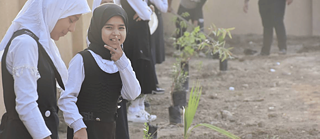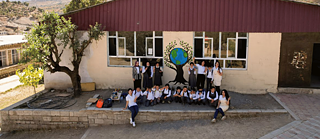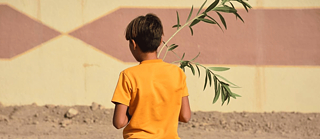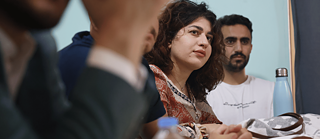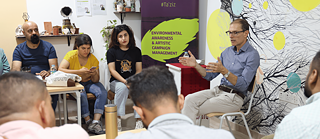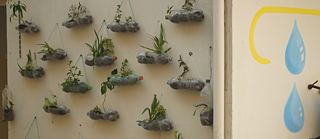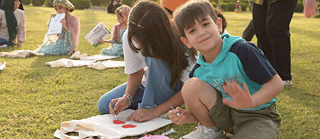Guan Eden – For a Sustainable Future
The Guan Eden project launched in 2020 to address urgent environmental challenges in Iraq. Under the theme of sustainability, eight campaigns were held in 2024 in the cities of Ranya, Babel, Nineveh, Baghdad, Halabja, Mosul, Khalifan, Soran, and Rwanduz, selected beforehand by a jury.
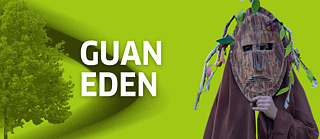
–Shnyar Yadgar, Campaign Manager in Halabja
As part of the “Colourful Ranya” campaign, artists and volunteers in Ranya and surrounding villages raised awareness among children and youth about animal welfare and species extinction. They organized weekly exhibitions on the topic at a cultural center.
In Baghdad, the “Bibon” project took place, where students crafted instruments from recycled materials, wrote songs about climate change, and performed concerts in public spaces.
“Participating in the project was a unique opportunity to connect with local and international experts in development and environmental fields and expand my network. Collaborating with the Goethe-Institut, a renowned global organization, enriched my personal and professional development and opened new doors for me on both local and international levels.”
– Marwah Taha, Campaign Manager of Environmental Art in Baghdad
In Mosul and its surroundings, the “Green Iraq” campaign involved children in exploring local environmental issues. They created stories on topics such as droughts and desertification, which were presented in a competition. In the second phase of the campaign, they produced content and videos on sustainability topics to raise awareness about environmental issues through social media.
The “Our Future in the Past” campaign included eight workshops with a total of 100 children. Reflecting on historical ways of life in Iraq, the children created clay works, which were later displayed in an exhibition.
The “Nineveh Acts” campaign aimed to raise awareness about endangered habitats in Nineveh. Through theater and music, children engaged with environmental topics and expressed their thoughts creatively. In ten workshops, they developed plays and songs addressing changes in their living environments. They also spoke with parents and grandparents about their childhoods to highlight differences from their own. After intensive rehearsals, they performed their prepared songs and plays at public venues in Nineveh.
The “Mrdawaji” campaign held workshops on sustainability, climate change, and health at five schools and a children's hospital in Halabja. School classes went on excursions to local landmarks and conducted cleanup drives. Using the collected plastic waste, children crafted vases, which were later used in awareness campaigns to promote greening urban spaces, including the children's hospital.
As part of the “My Green School” campaign, children at three schools in Soran, Khalifan, and Rwanduz learned about the connections between urbanization and climate change. They were given a small section of their schoolyard to create and maintain a garden over three months. Alongside gardening, they participated in artistic workshops and received valuable information on sustainable practices in daily life. This enabled them to discover the importance of nature and foster ecological responsibility.
At the end of each project year, a two-day closing event took place, consisting of an environmental carnival and an exhibition. The environmental carnival was a public street festival where visitors could learn about the diverse campaigns, held in Soran, Bexal, Hamdaniye, Ranya, and Baghdad. The exhibition, however, was a private event aimed at ministries to raise awareness about the projects and highlight their significance for the regions.

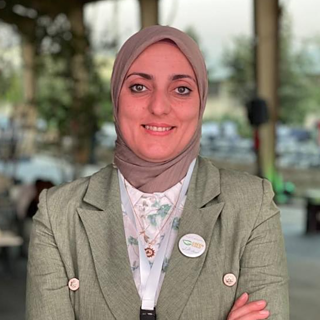
Marwah is an environmental engineer specializing in climate change issues.
“Guan Eden deepened my understanding of sustainable practices and their importance for environmental protection. By participating in various activities such as organizing events, conducting workshops, and engaging with the community, I was able to enhance my leadership, teamwork, and creative problem-solving skills. Moreover, I gained a deeper insight into the connection between ecological health and community well-being.”
Shnyar Yadgar (26), Campaign Manager in Halabja
Shnyar is an electrical engineer and currently manages the recycling center in Halabja. Her main responsibilities include organizing and conducting seminars for children of various age groups and university students. In her workshops, she educates about environmental protection, particularly the harmful effects of plastic, and demonstrates ways to protect the environment. Her work inspired her to apply for the Floating Forward project.
